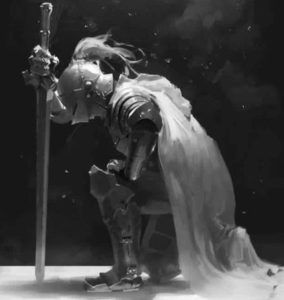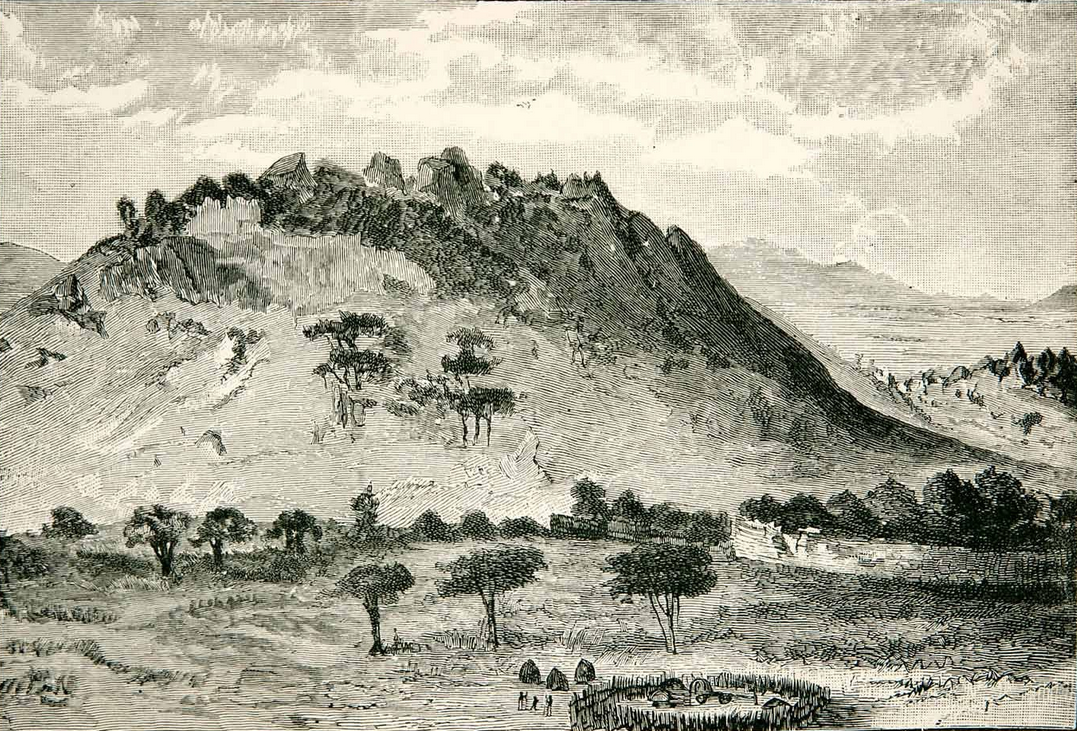A hawk-faced footman opened the door to the prince’s private residence even before Colter reached for its iron knocker. He waved Colter inside, squinting into the darkened street briefly before closing the door and sliding a heavy, oiled bolt into place. The footman led the Second Captain of His Majesty’s Royal Guard to a small dining room where the Crown Prince of Belden awaited him. He sat Colter in a chair immediately across from His Grace, placed a gilded chalice before each man, and silently retreated from the room.
Colter felt a drop of sweat run behind his ear as he waited for the prince to speak. The prince’s eye twitched. He cleared his throat. “I want you to kill my father,” he said.
A self-proclaimed god sat upon the ancient throne of Belden. Colter had watched his ruler’s apotheosis with alarm. He stood guard when the king sent his wife to the gallows and appointed a lookalike stable maiden his new goddess. He stood by when His Majesty began to demand the worship of his court’s nobles. He stood down when underlings, at the king’s command, led his captain to a dank prison cell for his insufficient theological enthusiasm. That last act of obedience pained him the most. When word arrived that the headsman’s price had been paid, Colter briefly considered driving a blade into His Majesty’s heart. Now the king’s only son was asking him to do exactly that.
“As his suffering servants withdraw,” the prince continued, “the king draws his bodyguard closer. You are the next captain of that guard. If you will not stop this madness, your successor will receive from me the same charge after leading you to the very cell your late captain so briefly inhabited.”
Colter examined the man asking him to commit regicide. The Crown Prince of Belden looked every inch a king. All forty of his years had been directed toward the day the scepter would pass into his dependable hands. No man in the kingdom, upon meeting His Grace, doubted he was a man whose broad shoulders could bear that responsibility.
But in recent months, those shoulders had begun to droop. Worry had written deep lines across the prince’s brow. Colter wondered how many of those lines were due to the king’s madness and how many resulted from the dangers inherent in speeding up the historical process by which a prince succeeds his father. He had known the prince for many years; he had never known him to be rash. Still, he hoped his next words would not cost him his head.
“Are you no man,” Colter asked, “that I must avenge your mother on your behalf?”
The prince’s knuckles whitened and his brow furrowed, but he held Colter’s eyes without blinking. The accusation obviously angered the prince. Colter had intended it to. What he wanted to see was how the man responded to it.
“You have doubtless heard the saying, ‘The king is dead. Long live the king!’ This king must die and another must take his place. Yet the law is clear: neither a patricide nor the son of such may ascend the throne. Had I brother or uncle to wear the crown in my stead, the deed would be done already by mine own hand. But you are not avenging my mother: you are the weapon of my vengeance. ”
Colter nodded, impressed that the man accepted moral responsibility for what he was asking. His Grace was either the most honest man Colter had ever met or he was the best actor. Colter believed it was the former. Still, he had one more test for the next king of Belden.
“And you have doubtless heard the saying, ‘Dead men tell no tales.’ As I will have intimate knowledge that could cost you the throne, you will surely understand my reluctance to take verbal assurances of my future well-being seriously.”

The prince appeared to consider this. “I shall present my eldest son as your hostage until the deed is done and you are quit the kingdom, should you so choose,” he said.
His Grace’s offer surprised Colter completely. Such an exchange could not be faked; Colter knew little Willem well. He also knew the risk the prince was taking, both with this conversation and placing his own offspring into the hands of a would-be assassin. The offer was a blunt recognition of the sense of honor that drove Colter: the prince trusted him. It was time to return that trust.
“That will not be necessary, Your Grace,” Colter responded, first arising from his chair and then taking a knee. “I will kill the king.”
The prince raised Colter to his feet and placed a hand atop his head as if to give his servant a royal blessing. “Do it quickly,” he said, “before such damage is done that I cannot mend it in a lifetime. My father has given the nobles two days to assemble their men for his invasion of Tannin. He must be dead before those troops reach the border, or his kingdom will die shortly thereafter.”
Colter was glad the prince had not mentioned payment. You don’t kill the king for money.
(Continued in Part II)










4.5
I thoroughly enjoyed Strumplets and look forward to the next chapter of this new story!
How does one get an invite to a MotW meetup? I am also in Kansas, but not the rural part.
We usually only have one big one each year, with smaller, more local ones on occasion, as those in any given area choose to get together. TBH, we are pretty exclusive, though, and have to get to know folks first.
I understand and agree with exclusivity in this regard. If any of you are willing to undertake the task, please contact me using the email I have entered. I would welcome the chance to go through whatever process you would feel is necessary.
Will do
Which not-rural part?
I’m in KC (Shawnee, to be more specific).
I used to live 2 blocks behind Hocker Grove. Small world.
If you liked Strumplets, here are 3 more you may enjoy:
A Test of His Metal. https://www.menofthewest.net/test-metal-part/
Snarl. https://www.menofthewest.net/10435-2/
Beggar’s Choice. https://www.menofthewest.net/beggars-choice-part/
Glad you’re enjoying them.
4